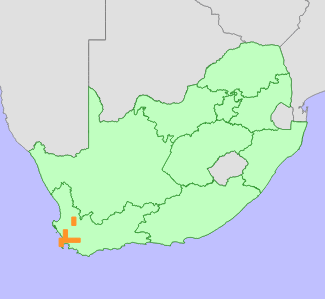|
Scientific Name | Lachnaea uniflora (L.) Crantz |
Higher Classification | Dicotyledons |
Family | THYMELAEACEAE |
Synonyms | Cryptadenia uniflora (L.) Meisn., Passerina uniflora L.f. |
National Status |
Status and Criteria | Vulnerable B1ab(ii,iii,iv,v) |
Assessment Date | 2006/08/23 |
Assessor(s) | N.A. Helme, J.B.P. Beyers & D. Raimondo |
Justification | EOO 9000 km², known from less than 10 locations. It has lost much of its habitat in the past, but over a period greater than three generations. There is ongoing habitat loss mainly due alien plant invasion, urban expansion and crop cultivation (vines). |
Distribution |
Endemism | South African endemic |
Provincial distribution | Western Cape |
Range | Darling to Cape Peninsula to Somerset West, and Twenty-four Rivers Mountains to Wolseley and Franschhoek Mountains. |
Habitat and Ecology |
Major system | Terrestrial |
Major habitats | Swartland Granite Renosterveld, Swartland Silcrete Renosterveld, Peninsula Sandstone Fynbos, Olifants Sandstone Fynbos, Hawequas Sandstone Fynbos, Peninsula Granite Fynbos, Boland Granite Fynbos, Breede Sand Fynbos, Cape Flats Sand Fynbos, Atlantis Sand Fynbos, Swartland Alluvium Fynbos, Breede Alluvium Fynbos |
Description | Sandy flats and sandy areas on lower mountain slopes. |
Threats |
| N.A. Helme (2006) noted invasive alien species and urban development as main threats to this species. Agriculture (wheat farming) is a severe past threat and most subpopulations on the west coast were lost to wheat farming. Majority of ploughing took place pre 1960s which is more than 3 generations ago (D. Raimondo). Agriculture, especially vines is an ongoing threat to this species throughout its range. Urbanisation is a severe past threat; most of the cape flats subpopulations were lost and there is only one site remaining in Kenilworth race course. Most of this lost took place between 1910 - 1960 which is more than 3 generations ago (D. Raimondo). |
Population |
Population trend | Decreasing |
Conservation |
| Not currently conserved in any formally protected area. |
Assessment History |
Taxon assessed |
Status and Criteria |
Citation/Red List version | | Lachnaea uniflora (L.) Crantz | VU B1ab(ii,iii,iv,v) | Raimondo et al. (2009) | | Lachnaea uniflora (L.) Crantz | VU A1c | Victor (2002) | |
Bibliography |
Beyers, J.B.P. 2001. The Cape genus Lachnaea (Thymeleaceae): a monograph. Strelitzia 11:1-115. National Botanical Institute, Pretora.
Goldblatt, P. and Manning, J.C. 2000. Cape Plants: A conspectus of the Cape Flora of South Africa. Strelitzia 9. National Botanical Institute, Cape Town.
Raimondo, D., von Staden, L., Foden, W., Victor, J.E., Helme, N.A., Turner, R.C., Kamundi, D.A. and Manyama, P.A. 2009. Red List of South African Plants. Strelitzia 25. South African National Biodiversity Institute, Pretoria.
Victor, J.E. 2002. South Africa. In: J.S. Golding (ed), Southern African plant Red Data Lists. Southern African Botanical Diversity Network Report 14 (pp. 93-120), SABONET, Pretoria.
|
Citation |
| Helme, N.A., Beyers, J.B.P. & Raimondo, D. 2006. Lachnaea uniflora (L.) Crantz. National Assessment: Red List of South African Plants version 2024.1. Accessed on 2026/01/24 |
 Comment on this assessment
Comment on this assessment


